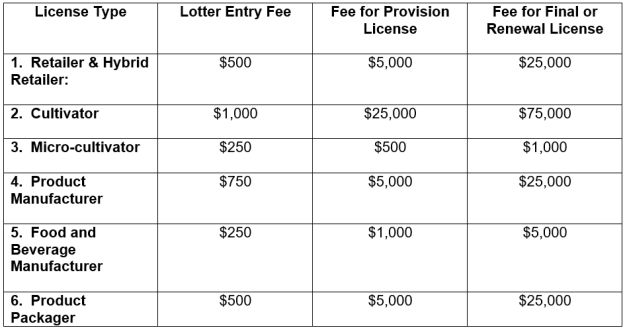To print this article, all you need is to be registered or login on Mondaq.com.
Co-Authored by Jessica Tang
Researcher/Summer Associate 2021
There is growing excitement among Connecticut’s business
community about the prospects for a legal adult-use marijuana
market. Entrepreneurs, growers, and investors are beginning to
develop business plans and looking for more information on how to
obtain a license. Though specific licensing criteria and
application deadlines have not been established yet, the law
provides some guidance to allow the business community to start
planning now.
LICENSE TYPES, REQUIREMENTS & FEES
The law creates two groups of applicants, Social Equity
Applicants and general applicants. A “Social Equity
Applicant” is at least 65% owned and controlled by an
individual or individuals, or is an individual, who:
- Had an average household income of less than 300% of the state
median household income over the three tax years immediately
preceding the application; and
(a) was a resident of a
disproportionately impacted area for not less than five of the ten
years immediately preceding the application; or
(b) was a resident of a
disproportionately impacted area for not less than nine years prior
to turning 18.
For all applicants, there are 7 types of licenses available with
set fee schedules as outlined in the table below.

Any person qualifying as a Social Equity Applicant will receive
a 50% discount on all fees for its first three renewal cycles.
Consequently, those who qualify will receive substantial financial
savings to begin their operations. However, whether classified as a
Social Equity Applicant or a general applicant, medical marijuana
dispensary operators who wish to convert their existing license
into a hybrid retailer license — which would allow the dispensary
to sell for both medical and recreational use — must pay a fee of
$1,000,000. Similarly, an existing medical marijuana producer
wishing to convert their license to include recreational marijuana
must pay a fee of $3,000,000. These established marijuana
businesses will not receive an automatic 50% discount on license
fees even if they qualify as Social Equity Applicants, but may be
eligible for discounted fees if they commit to creating equity
joint ventures.
The Connecticut Department of Consumer Protection (the “Department”) will not award a license to any lottery
applicant who has two or more licenses of a given license type at
the time of the lottery, until June 30, 2025. As of now, the
legislature has not set limits on the number of applications an
applicant may submit.
LOTTERY SYSTEM
Licenses will be awarded by lottery with Social Equity
Applicants drawn from a separate lottery than general applicants.
Social Equity Applicants will receive 50% of all licenses awarded
for each license type, while general applicants be awarded the
remaining 50% of licenses.
Award of a Provisional License and Application for Final
License
Once an applicant has been selected from the lottery, licenses
are provided in a two-step process. First, the applicant will
receive a provisional license, provided the applicant completes its
application within 60 days and pays the necessary fees. The
provisional license will expire 14 months later at which time an
applicant must apply for a final license by paying the required fee
and providing evidence that it has met certain criteria.
Priority for Existing Dispensaries
It is important to note that, though Social Equity Applicants
will receive priority over general applicants, existing medical
marijuana dispensaries still may be first in line. A dispensary may
convert its license to a hybrid retailer license on or after
September 1, 2021, without going through the lottery process.
Dispensary facilities that have been approved by the Department and
that have converted to hybrid retailers may open to the general
public and commence adult use cannabis sales at a date to be
published on the Department’s website. State regulators
currently anticipate retail sales of adult-use marijuana will begin
by the end of 2022.
TIMELINE: LOOKING AHEAD TO LICENSURE
Prospective applicants should keep in mind the following
important dates:
- July 31, 2021: All appointments to The Social Equity Council
(the “Council”) should be made by this date. The Council
is established to create ownership, residency and income
requirements for Social Equity Applicants and to review
applications of social equity applicants. As of July 22, 2021,
several members had been appointed. - September 1, 2021: The Council will post the necessary
documentation requirements on its website to inform applicants of
such requirements prior to the start of the application
period. - 30 days after the Council identifies the licensing criteria for
Social Equity Applicants, the Department will begin accepting
applications for all license types. Prior to this date, the
Department will set the maximum number of applications to be
considered for each license type; 50% of which will be solely
dedicated to Social Equity Applicants.
Of course, dates are subject to delays, which have occurred in
other states that recently passed adult-use marijuana laws. The big
questions left unanswered by the law include when the Department
will start accepting applications, and the projected timeline for
license approval.
In sum, there is much uncertainty associated with the license
requirements and timeframe for the launch of recreational marijuana
sales in Connecticut. Nevertheless, prospective applicants can
identify the type of license they want, start budgeting for the
license fees, determine whether they qualify for priority as
existing dispensaries or Social Equity Applicants, and determine
the structure of their business. We will continue to analyze this
law and publish updates as more information becomes available.
The content of this article is intended to provide a general
guide to the subject matter. Specialist advice should be sought
about your specific circumstances.
POPULAR ARTICLES ON: Cannabis & Hemp from United States

